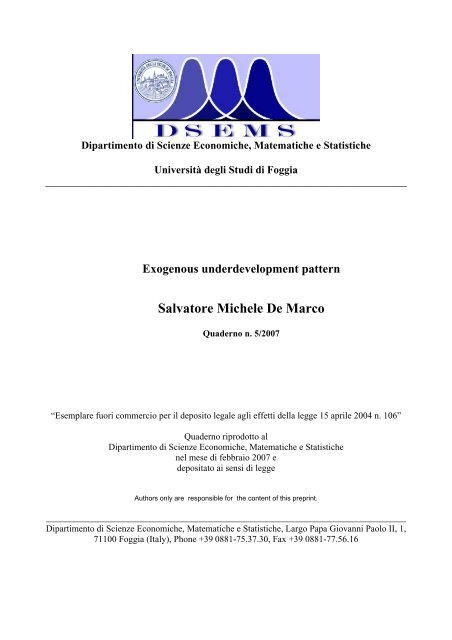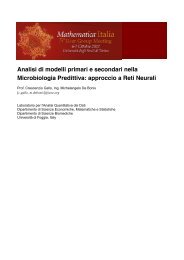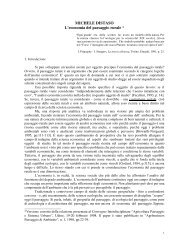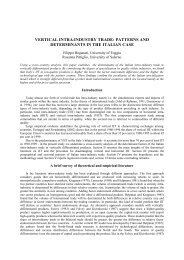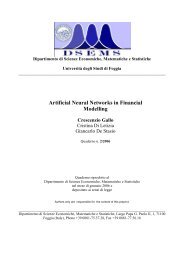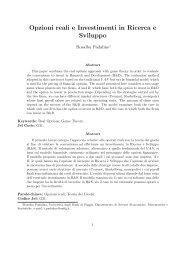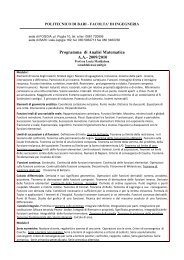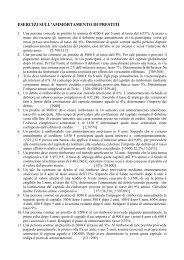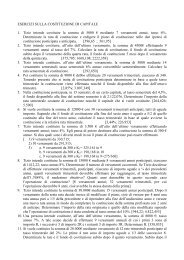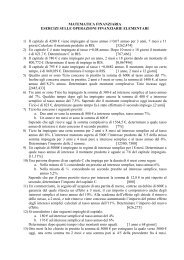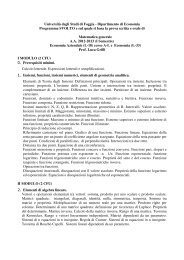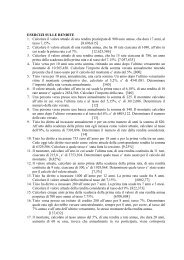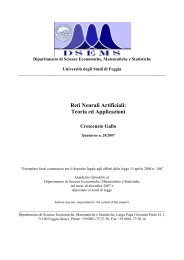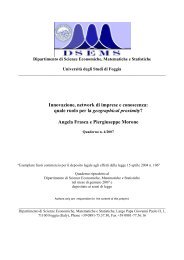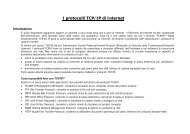Salvatore Michele De Marco - Dipartimento di Scienze Economiche ...
Salvatore Michele De Marco - Dipartimento di Scienze Economiche ...
Salvatore Michele De Marco - Dipartimento di Scienze Economiche ...
Create successful ePaper yourself
Turn your PDF publications into a flip-book with our unique Google optimized e-Paper software.
<strong>Dipartimento</strong> <strong>di</strong> <strong>Scienze</strong> <strong>Economiche</strong>, Matematiche e Statistiche<br />
Università degli Stu<strong>di</strong> <strong>di</strong> Foggia<br />
____________________________________________________________________<br />
Exogenous underdevelopment pattern<br />
<strong>Salvatore</strong> <strong>Michele</strong> <strong>De</strong> <strong>Marco</strong><br />
Quaderno n. 5/2007<br />
“Esemplare fuori commercio per il deposito legale agli effetti della legge 15 aprile 2004 n. 106”<br />
Quaderno riprodotto al<br />
<strong>Dipartimento</strong> <strong>di</strong> <strong>Scienze</strong> <strong>Economiche</strong>, Matematiche e Statistiche<br />
nel mese <strong>di</strong> febbraio 2007 e<br />
depositato ai sensi <strong>di</strong> legge<br />
Authors only are responsible for the content of this preprint.<br />
_______________________________________________________________________________<br />
<strong>Dipartimento</strong> <strong>di</strong> <strong>Scienze</strong> <strong>Economiche</strong>, Matematiche e Statistiche, Largo Papa Giovanni Paolo II, 1,<br />
71100 Foggia (Italy), Phone +39 0881-75.37.30, Fax +39 0881-77.56.16
ABSTRACT<br />
“Exogenous underdevelopment pattern”<br />
<strong>Salvatore</strong> <strong>Michele</strong> <strong>De</strong> <strong>Marco</strong><br />
The main dynamics of capitalism is the creation of overproduction in order to search for an<br />
internal and foreign market outlet.<br />
While increasing the overproduction, both the expansion process and the internationalization of<br />
consumption raise.<br />
The context just described leads to think about the existence of rich and emerging economies<br />
producing an excess of supply compared with their internal demand (net supply) that must be<br />
allocated to the poor economies showing an excess of demand compared with their internal supply<br />
(net demand).<br />
We are, after all, in the compensating structure of the world economy, where the poor countries<br />
are setting against the rich and emerging countries; these last two are in competition with each<br />
other. Besides, the poor countries absorb the surplus of the rich and emerging ones.<br />
The assertion of monetarism, in the last decades, encouraging the market outlets abroad to the<br />
detriment of the outlets towards the public sector, leads to stress the tensions between the<br />
advantaged and <strong>di</strong>sadvantaged nations. This context makes more doubtful the future economical<br />
perspectives.<br />
The compensating structure of the world economy facilitates the exogenous nature of the<br />
underdevelopment of wide areas of the planet that are addressed to absorb the productive excesses<br />
of the advanced economies.<br />
The purpose of this current theoretical contribution is just to formalize, through an appropriate<br />
economical and mathematical pattern, the interdependence between the strong economical world<br />
and the weak economical world.<br />
Key-words: Monetarism; Underdevelopment; Market outlet; Overproduction.<br />
Jel Classification: E 10; F 01; F 02; F 15; F 16; F 17; 0 19.<br />
2


